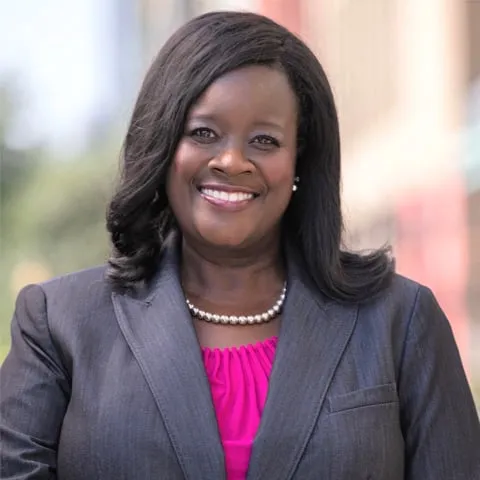College business and financial officers are balancing heavy plates these days, as a wide swath of institutions face revenue pressures brought on by enrollment declines and higher operating costs.
Those challenges could continue for the foreseeable future. At the same time, finance leaders in higher education are taking on even more responsibilities as they continue to have a hand in many — if not most — facets of complicated university enterprises.
In June 2023, Kara Freeman became president and CEO of the National Association of College and University Business Officers, a professional organization representing administrative and financial executives at higher ed institutions. Freeman previously spent 17 years at the American Council on Education where she held executive roles including chief operating officer and chief information officer.
In her new role, Freeman said she has focused on amplifying the voices of colleges’ finance teams within their institutions and providing them with much-needed resources. Higher Ed Dive sat down with Freeman and Timothy McDonough, NACUBO’s senior vice president for strategic partnerships and communications, at the organization’s Washington, D.C., offices last month to talk about the state of higher ed finance and NACUBO’s role in helping colleges navigate the rough waters.
Editor’s note: This interview has been edited for length and clarity.
HIGHER ED DIVE: Up to this point, what have been your main priorities since you started at NACUBO?
KARA FREEMAN: I came into this role with a pretty solid understanding of what’s top of mind for presidents. As I came to NACUBO, what I saw as being very important is that the voices of business officers really need to be heard.

Kara Freeman, president and CEO at NACUBO
Permission granted by NACUBO
One of the other large priorities for me is the value proposition of higher education. I don’t think our stories are being told in a way that is resonating with the public, so that they see the value of higher education. Higher education helps not just our students but helps our nation. Business officers have insight into that.
One of the things I wanted to accomplish at NACUBO was ensuring that any institution — no matter how well or not so well resourced — had tools to help make business decisions. We were already well underway with an initiative to build out pragmatic tools to help with everything from budgeting to program prioritization. We rolled those out this past July.
We sometimes hear that there’s almost a taboo around talking about the finances of a college. How do you open up financial communication across the board on campus — with the president, with the trustees, with the rank and file staff and faculty?
FREEMAN: Based on your audience, your messaging may need to be different. For example, presidents want to talk about budgets. They want to talk about advancement and bringing in financing to the institution. Focus with your particular audience on things that resonate with them.

Timothy McDonough, senior vice president for strategic partnerships and communications at NACUBO
Permission granted by NACUBO
One of the things we’ve done over the past year at NACUBO is professional development programming related to communications. We actually have a new session that’s just kicked off here recently focusing on how do you take technical data and communicate that data. How do you communicate in the way that reaches that audience, in a way that they trust you?
TIMOTHY McDONOUGH: One of our members, a chief business officer, was saying she encourages her team to be visible on campus and to go to the faculty meetings, go to art openings, go to receptions, go to whatever is going on campus. People know who you are. You build that trust, those relationships, so that you don’t only see this person when it’s time to talk budgets.
What do you hear from members about the challenges they’re facing or just things that they’re interested in doing that might shape NACUBO’s priorities over the next couple of years?
FREEMAN: One of the big areas that they’re focused on is student success.
When we did our recent survey of chief business officers, we asked them what are the skills you think CBOs need. Obviously, strategic finance comes up, but so do strategic thinking and strategic planning. As far as skills in the future, one of the things was identifying new or emerging business models.
That dovetails with where the concerns lie. There are resource constraints. The value proposition [of attending college] comes up for our members as well, as one of their top concerns. Investing in technology is always on the list, but it came up at the top. Think about cybersecurity, what’s happening with AI [artificial intelligence] and just the need to use technology to help drive efficiencies. The technology costs, the dollars involved. The workforce is another big one right now. It’s difficult to find folks who have the CPA [certified public accountant] credential.
Our role at NACUBO is to provide not only the resources — we have just an abundance of resources that our CFOs and their teams have access to — but we also work to shore up the teams and diversify and strengthen that pipeline of those who are going to be prepared to lead business offices in the future. That’s important work for us. Many of our chief business officers have not only finance areas in their portfolio, but human resources, ERM — Enterprise Risk Management falls under them — facilities, public safety. So their role has really increased. They need professional development in areas that maybe 20, 30 years ago were not as necessary.
Are your members anticipating that the federal election outcome will change their jobs and the finances of their institutions?
FREEMAN: There’s a level of concern when you think about taxing endowments — something that comes up — and also looking at the overall financing of colleges and institutions, and some of the tax incentives that we want to ensure remain in place. And then student aid — what’s going to happen to students in need? Section 127 [of the Internal Revenue Code] comes to mind as well, which is the tax-free tuition benefit for college employees and their families.
We’ve seen administrations change before. We’ve been through this before, and we roll our sleeves up and get ready for the work ahead.
McDONOUGH: There’s challenges, always, in these situations — but also opportunities that pop up in the course of discussion, whether it’s deregulation or funding for different student aid programs. But I think folks are pretty concerned, at least initially. But it’s still too early to know where any of it’s going.
We write a lot about budget crunches. Do you expect more pressure down the line, or a sort of steady state, or for things to get better?
FREEMAN: The whole sector is so diverse. When you look at our regional publics, you look at small private institutions, there are some that are under stress. What’s our role as NACUBO to assist in that area? Part of the role of the chief business officer is to look at new business models, new business practices, bring that type of insight to the institutions. That is a big push, particularly coming out of the pandemic.
McDONOUGH: There’s always been institutions under stress. We’ve seen more of that, though. Some of these places are surprisingly resilient. A lot of private institutions, for example, are doing shared services — back office operations, purchasing, software, things like that where they can share costs.
FREEMAN: That’s a thread that has come out over the past year. There’s a lot of interest in shared services.
Are there business and finance stories from the higher ed world that you think are not talked about or not covered enough?
FREEMAN: I don’t know that the chief business officer or chief financial officer comes to top of mind when you think of the various important roles on a campus. And I want to change that. You’re talking about academic programs, you’re talking about facilities and buildings and the campus, issues such as campus unrest — all of that is touched and influenced by the chief business officer, but usually behind the scenes. The chief business officer is responsible for making the enterprise work.
McDONOUGH: Still to be determined is the use of AI. NACUBO has been doing a lot of work in that. You’re seeing a lot of institutions that are not using it to downsize but to leverage staff in different ways. They could use AI in certain areas of the campus, repetitive type work. Admissions is using it too.
I was at a meeting where [institution leaders] were talking about how AI has really changed their admissions process because they used AI for repetitive questions that applicants have. Where this used to take two or three staff handling phone calls and emails, now that staff can be addressing complicated issues instead.


